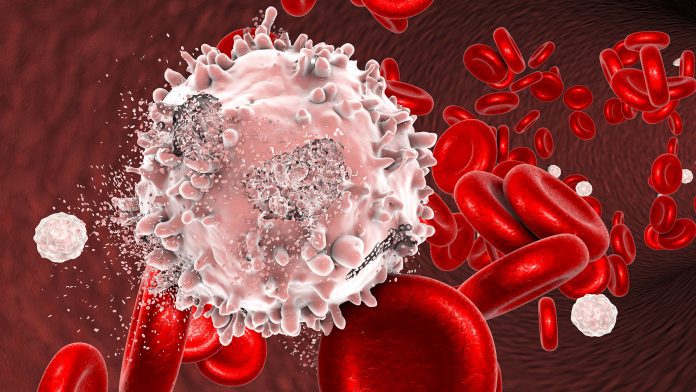
Experts have identified a drug that reduces the risk of leukaemia recurring when administered in combination with a bone marrow transplant.
A team of researchers from the University of Michigan Health Rogel Cancer Center have ascertained that a treatment – known as interferon – can lower the risk of leukaemia recurrence in high-risk patients by 20% when given alongside a bone marrow transplant.
The research findings are published in Blood Advances.
The potential of interferon
The study analysed a group of patients with an advanced form of acute myeloid leukaemia that has become resistant to various treatments. The next stage for these individuals was receiving a bone marrow transplant from a donor, a process that is not recommended to patients who are severely ill. This is due to it being an extremely risky option, with 60% of patients relapsing within six months of receiving the transplant.
The team conducted prior studies that signified that the drug interferon could improve the function of a vital subset of dendritic cells that selectively enhance T cells that destroy leukaemia cells after a bone marrow transplant. The drug is employed to combat some autoimmune diseases, although the response is not long-lasting.
Boosting bone marrow transplant response
To improve the efficacy of the treatment, the researchers employed a long-acting form of interferon called pegylated IFN-alpha, which is commercially used to treat both hepatitis B and C, in addition to various blood cancers. The team performed an early-stage clinical trial comprising 36 patients who were administered four doses of pegIFN-alpha every two weeks, beginning just before their transplant. After six months, 39% of the patients had relapsed, lowering the disease relapse rate by over 20%. The medication was generally well-tolerated, with side effects similar to what many bone marrow transplant patients experience and was not observed to increase graft-vs.-host disease.
John Magenau, the lead author of the study and a clinical associate professor of internal medicine at Michigan Medicine, said: “Despite the curative potential of a bone marrow transplant, relapse remains the greatest barrier to successful outcomes. This result suggests that a brief course of peg-IFN may increase the anti-leukemic potency of an allogeneic transplant. If this intervention can reduce relapse, even by 10-20%, it could translate into improved survival.”
Although the researchers note that more investigations are required in a larger, randomised clinical trial to confirm the findings, they believe that new strategies are vital for this group of patients who have few options.
Pavan Reddy, the division chief and Frances and Victor Ginsberg Professor of Hematology/Oncology, said: “It’s not a home run. We moved the bar up, but it’s not high enough. We need to determine what else we can do in addition to interferon to get to those patients who still relapsed.”
The team are now planning to perform a randomised trial to explore the potential of interferon in other types of transplants or blood cancer.









